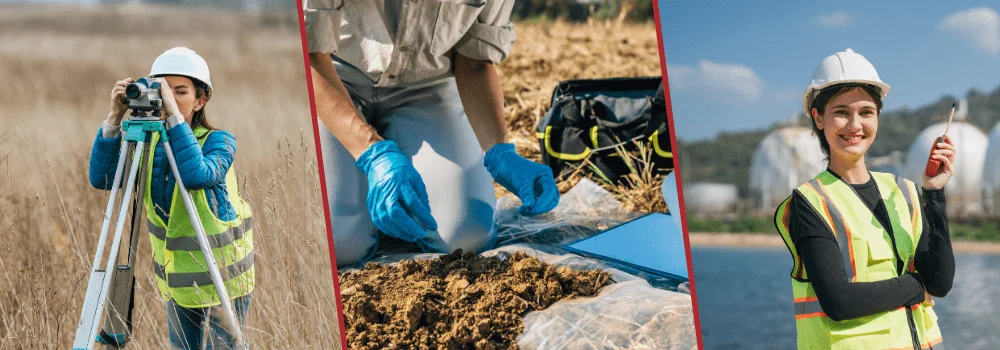How to Become a Geophysicist?
Explore the path to becoming a Geophysicist, including key steps, eligibility criteria, essential tasks, and career opportunities in the exciting field of geophysics.

In this Career Outline

Introduction to Geophysicist
"The natural world is a book written in the language of geology, and geophysicists are its most dedicated readers."
Geophysicists are scientists who study the earth's structure, often working in the construction, oil, and government sectors. They conduct fieldwork and lab research, using gravity, magnetic fields, electricity, and seismic waves to locate natural resources like petroleum and metals. Some focus on assessing environmental impacts, while others evaluate sites for development projects. Geophysicists in the mineral and oil industries play a key role in resource exploitation.
Steps to Become a Geophysicist:
Step-1
Gain a clear understanding of what a Geophysicist does. This includes studying the Earth's physical properties using scientific methods.
Step-2
Obtain a bachelor's degree in geophysics, physics, geology, or a related field.
Step-3
Engage in internships or research projects to acquire practical experience.
Step-4
Consider earning a master's or doctoral degree in geophysics to enhance career prospects.
Step-5
Depending on your region, pass relevant certification or licensing exams.
Step-6
Acquire proficiency in using geophysical instruments and software.
Step-7
Connect with professionals in the field and seek guidance from experienced geophysicists.
Eligibility Criteria
| Eligibility Criteria | Description |
|---|---|
| Eligibility | Must possess at least 50% aggregate marks in 12th grade from a recognized board (PUC/CBSE/ICSE/ISC, etc.). |
| Educational Background | High school diploma or equivalent. |
| Undergraduate Degree | A B.Sc or B.Tech in Geophysics, Physics, Geology, Earth Sciences, or a related field is required. |
| Postgraduate Degree | An M.Tech in Geological Engineering or a related field is advantageous for advanced roles and better learning opportunities. |
| Entrance Exams | Undergraduate Level: Should procure a valid score in entrance exams like JEE-Main, KIITEE, SRMJEE, CEE, HITSEE, CET, etc. |
- Must have at least 50% in 12th grade from any recognized board (PUC/CBSE/ICSE/ISC), with a science background.
- Need a valid score in Entrance exams after 12th like JEE-Main, KIITEE, SRMJEE, or CET. Some colleges offer their own exams if scores are low.
- Must obtain a B.Sc/B.Tech degree or a relevant diploma to pursue a career as a Geophysicist.
- An M.Tech in Geological Engineering can enhance career prospects and provide advanced knowledge.

Not eligible to pursue this career?
Find out different career options based on your current academic accomplishments. Enquire with our career experts and build a roadmap to your career success!
Tasks to perform as a Geophysicist:
Knowledge & Skills Required
Geophysicists must possess a wide array of skills to succeed in their careers. Here are the key knowledge areas and skills needed to excel in this field:
| Knowledge Required | |
|---|---|
| Understanding of Earth's structure and processes | Knowledge of methods like seismic, magnetic, and gravitational surveys |
| Principles of physics relevant to geophysical studies | Proficiency in data analysis and geophysical software |
| Advanced mathematical skills for data analysis | Awareness of environmental impacts of geophysical studies |
| Skills Required | |
|---|---|
| Problem-Solving Skills | Analytical Skills |
| Communication Skills | Technical Proficiency |
| Teamwork | Attention to Detail |
Understanding What are soft skills? and why is it important,as they complement technical abilities and enhance overall performance in the field of Geophysicist.

The Knowlegde and Skills don't intrigue you?
Your career may not align with your interests. Identify them and match with careers requiring those skills for faster growth and success!
Job roles offered for a Geophysicist:
Once you become a Geophysicist, numerous career paths open up:
Uses chemical techniques to solve geoscience problems, often involving environmental commodities like fuels and gemstones. Work involves analyzing data from GIS and satellites.
Examines volcanoes to analyze eruptions, forecast future events, and evaluate their effects.Their work includes monitoring volcanoes and communicating findings to the public.
Analyzes geophysical data for petroleum and energy operations, leads teams, and requires strong communication skills. They work with large data sets and various tools.
Focuses on optimizing oil and gas extraction by studying reservoir materials. Requires advanced degrees and field experience, and involves designing experiments on mineral characteristics.
Researches ocean-related issues, including marine life, water properties, and seafloor features. Specializations include biological, physical, chemical, and geological oceanography, with applications in conservation, climate forecasting, and more.

Not sure where you fit in?
With countless career options, choosing the right path can be tough. Analysis and guidance sessions help clarify what to study, pursue, and achieve.
Career Opportunities for a Geophysicist:
Geophysicists can opt for various fields of work in the companies listed below:
| Oil and Natural Gas | CGG | Schlumberger |
| Halliburton | Petroleum Geo-Services | ExxonMobil |
| L&T Technology Services | Essar | Cairn Energy India |
| Oil India |
Colleges offering courses for Geophysicist:
Here is the list of colleges offering the Best courses after 12th:
| Indian School of Mines, Dhanbad | Indian Institute of Technology, Kharagpur |
| Vellore Institute of Technology, Vellore | DM College of Science, Manipur |
| National Institute of Technology, Raipur | Banaras Hindu University, Varanasi |
| Fergusson College, Pune | Hansraj College, University of Delhi |
| Andhra University, Visakhapatnam | Amity University, Noida |
End Note
Becoming a Geophysicist is an exciting journey that combines science, technology, and exploration. With the right education, experience, and skills, you can make significant contributions to understanding our planet. Connect with our experts at SetMyCareer to guide you with Career counselling after graduation along your career goals and help you navigate the path to becoming a successful Geophysicist.
In this Career Outline
You don't fit in as a Geophysicist?
Find out your best suitable career by booking an appointment with our experts
Book nowGet In Touch
No. 14/595, 1st Floor, Nanjappa Reddy Layout, Koramangala 8th Block, Bangalore 560095





